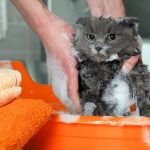Cats are beloved pets that bring joy and companionship to millions of households around the world. As responsible pet owners, it is our duty to ensure that our feline friends receive the proper nutrition they need to thrive.
While cats are obligate carnivores and require a diet rich in protein, it’s natural to wonder if they can eat other types of food, such as fruits and vegetables. One such food is applesauce, a popular snack among humans. But is it safe for cats to eat applesauce?
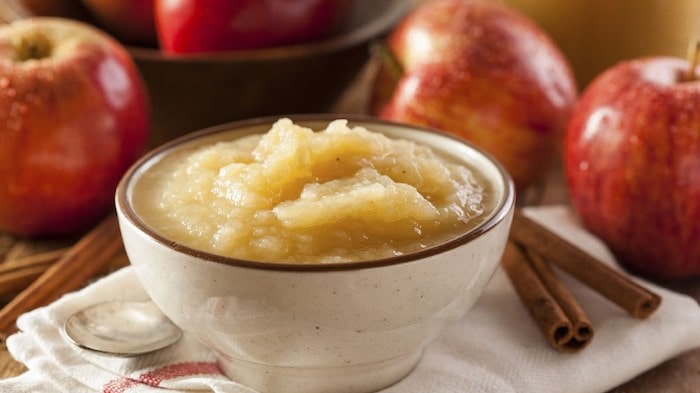
In this article, we will explore the risks and benefits of cats consuming applesauce, as well as alternative foods that can provide similar nutritional benefits.
As with any change to your cat’s diet, it’s important to seek advice from a veterinarian before making any changes to ensure your cat’s health and well-being.
What is Applesauce?
Applesauce is a sweetened or unsweetened puree made from cooked and mashed apples. It is a common food in many cultures, often served as a snack, side dish, or ingredient in various recipes.
Applesauce is typically made by cooking apples with water or juice until they are soft and then pureeing them until they reach a smooth consistency.
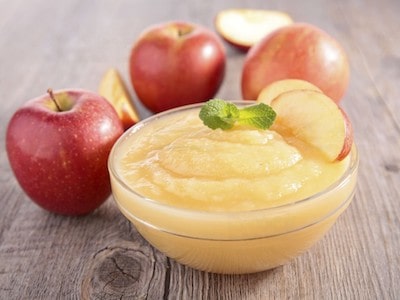
Sugar or other sweeteners can be added to enhance the taste, while spices such as cinnamon or nutmeg are sometimes used to give the sauce a more complex flavor.
Commercially produced applesauce may also contain preservatives or other additives. Applesauce is a good source of fiber and vitamin C and can be a healthy snack option for humans.
However, whether it is safe for cats to eat applesauce depends on several factors, such as their individual dietary needs and any potential risks associated with the food.
Can Cats Eat Applesauce?
While applesauce is not toxic to cats, it is not an ideal food for them to consume regularly. Cats are obligate carnivores and require a diet that is high in protein, which applesauce lacks.
Additionally, cats do not have a natural sweet tooth and may not even enjoy the taste of applesauce. Therefore, there is no nutritional benefit for cats to consume applesauce.
Moreover, there are potential risks associated with cats eating applesauce. One major concern is the high sugar content of most commercially available applesauce. Consuming too much sugar can lead to obesity and even diabetes in cats.
Furthermore, cats may also experience digestive problems such as diarrhea or vomiting if they eat too much applesauce or are sensitive to the ingredients in the sauce.
In some cases, cats may be allergic to apples or other ingredients in the applesauce, which can cause more serious health problems.
Benefits and Risks of Feeding Applesauce for Cats
Feeding applesauce to cats can have both benefits and risks. Here are some of the potential advantages and disadvantages of feeding applesauce to cats:
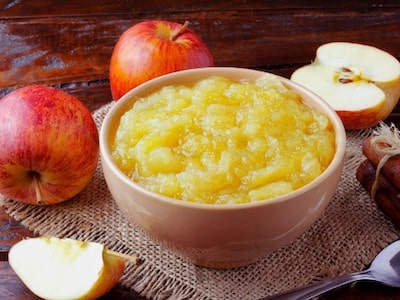
Benefits:
- Hydration: Applesauce contains a high amount of water, which can help keep your cat hydrated, especially if they don’t drink enough water on their own.
- Fiber: Dietary fiber found in applesauce can aid in maintaining cats’ digestive health.
- Vitamins and minerals: Vitamin C found in applesauce can enhance the immunity system of your feline friend as it comprises essential minerals and vitamins.
- Digestive problems: Cats with digestive problems like constipation or diarrhea can benefit from applesauce in certain situations.
Risks:
- High sugar content: Cats can suffer from obesity, diabetes, and other health issues due to the high sugar content present in most commercial applesauce.
- Allergies: Skin problems, digestive issues or serious health problems may arise due to the allergic reaction of some cats towards apples or other ingredients present in applesauce.
- Digestive problems: Although applesauce can improve digestion in certain cats, it may also lead to digestive complications like diarrhea or vomiting in different ones.
- Choking hazard: Cats may choke on applesauce, particularly if it has big fruit chunks or if they consume it too fast.
What Fruit Can My Cat Eat
As obligate carnivores, cats have different nutritional needs than humans and are not designed to digest fruits and vegetables in large quantities. However, some fruits are safe for cats to eat in small amounts and can provide some nutritional benefits. Here are some examples of fruits that are safe for cats to eat:
- Apples: Although cats should avoid consuming applesauce, they can enjoy small portions of fresh apple that are free from seeds and core. Apples are an excellent source of fiber and vitamin C for cats.
- Blueberries: Cats can be given blueberries as an occasional treat because they are a good source of antioxidants.
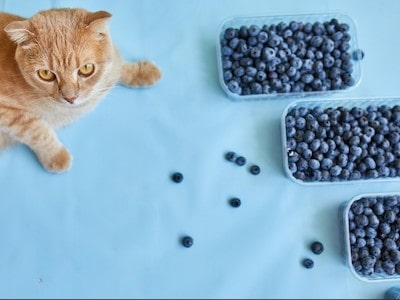
- Cantaloupe: Providing cats with a small amount of cantaloupe as a treat is feasible because it is an excellent source of vitamins A and C.
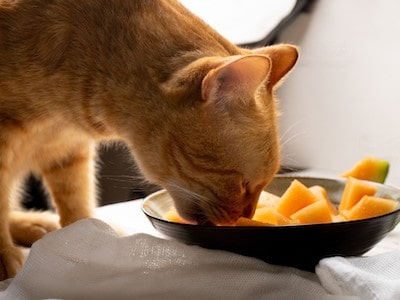
- Watermelon: Cats can be given watermelon as a treat in small quantities, since it is rich in water and aids in keeping them hydrated.
- Banana: Cats can safely eat bananas in small quantities as a treat. Bananas are rich in fiber and potassium, making them a nutritious option.
FAQs
Is applesauce bad for cats?
Applesauce is not necessarily bad for cats, but it does not provide any nutritional benefits that cats need and can potentially harm their health if consumed in large quantities or if they are allergic to any of its ingredients.
Can cats be allergic to applesauce?
Yes, some cats may be allergic to apples or other ingredients in the applesauce, which can cause more serious health problems.
Can I give my cat applesauce as a treat?
While small amounts of unsweetened applesauce as an occasional treat is unlikely to cause harm, it is not recommended as a regular part of their diet. There are many other safe and healthy options available that are specifically formulated for cats.
Can cats eat human food?
Some human foods are safe for cats to eat in small amounts, while others can be toxic or harmful to their health. It’s important to know which foods are safe and which are not before offering them to your cat.
Well, It’s a Wrap
In conclusion, while cats can technically eat applesauce in small amounts, it is not a recommended food for them to consume regularly. As obligate carnivores, cats require a diet that is high in protein and specific nutrients that can only be found in cat food that is specifically formulated for their needs.
While some fruits can be safely given to cats as an occasional treat, it’s important to do so in moderation and to consult with your veterinarian before introducing any new foods into your cat’s diet.Providing your cat with a balanced diet and appropriate treats can help ensure their overall health and wellbeing.
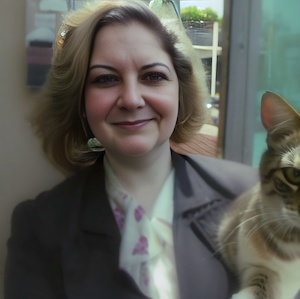
Charlene Pare is the founder of Cat Likes Best. She manages and strategizes the content published on this website. When she isn’t working, she enjoys exploring the city around with her Ameican Shorthair kitty–Moli. Being a technocrat and an avid cat lover, she also writes on pet tech products and some of the featured articles.


